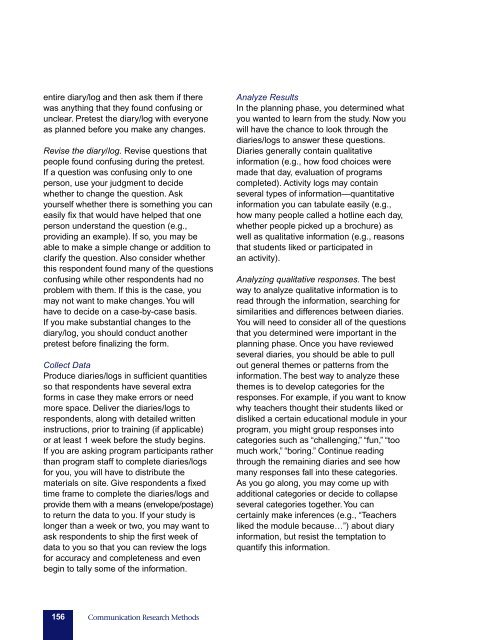pink-book
pink-book
pink-book
You also want an ePaper? Increase the reach of your titles
YUMPU automatically turns print PDFs into web optimized ePapers that Google loves.
entire diary/log and then ask them if there<br />
was anything that they found confusing or<br />
unclear. Pretest the diary/log with everyone<br />
as planned before you make any changes.<br />
Revise the diary/log. Revise questions that<br />
people found confusing during the pretest.<br />
If a question was confusing only to one<br />
person, use your judgment to decide<br />
whether to change the question. Ask<br />
yourself whether there is something you can<br />
easily fix that would have helped that one<br />
person understand the question (e.g.,<br />
providing an example). If so, you may be<br />
able to make a simple change or addition to<br />
clarify the question. Also consider whether<br />
this respondent found many of the questions<br />
confusing while other respondents had no<br />
problem with them. If this is the case, you<br />
may not want to make changes. You will<br />
have to decide on a case-by-case basis.<br />
If you make substantial changes to the<br />
diary/log, you should conduct another<br />
pretest before finalizing the form.<br />
Collect Data<br />
Produce diaries/logs in sufficient quantities<br />
so that respondents have several extra<br />
forms in case they make errors or need<br />
more space. Deliver the diaries/logs to<br />
respondents, along with detailed written<br />
instructions, prior to training (if applicable)<br />
or at least 1 week before the study begins.<br />
If you are asking program participants rather<br />
than program staff to complete diaries/logs<br />
for you, you will have to distribute the<br />
materials on site. Give respondents a fixed<br />
time frame to complete the diaries/logs and<br />
provide them with a means (envelope/postage)<br />
to return the data to you. If your study is<br />
longer than a week or two, you may want to<br />
ask respondents to ship the first week of<br />
data to you so that you can review the logs<br />
for accuracy and completeness and even<br />
begin to tally some of the information.<br />
Analyze Results<br />
In the planning phase, you determined what<br />
you wanted to learn from the study. Now you<br />
will have the chance to look through the<br />
diaries/logs to answer these questions.<br />
Diaries generally contain qualitative<br />
information (e.g., how food choices were<br />
made that day, evaluation of programs<br />
completed). Activity logs may contain<br />
several types of information—quantitative<br />
information you can tabulate easily (e.g.,<br />
how many people called a hotline each day,<br />
whether people picked up a brochure) as<br />
well as qualitative information (e.g., reasons<br />
that students liked or participated in<br />
an activity).<br />
Analyzing qualitative responses. The best<br />
way to analyze qualitative information is to<br />
read through the information, searching for<br />
similarities and differences between diaries.<br />
You will need to consider all of the questions<br />
that you determined were important in the<br />
planning phase. Once you have reviewed<br />
several diaries, you should be able to pull<br />
out general themes or patterns from the<br />
information. The best way to analyze these<br />
themes is to develop categories for the<br />
responses. For example, if you want to know<br />
why teachers thought their students liked or<br />
disliked a certain educational module in your<br />
program, you might group responses into<br />
categories such as “challenging,” “fun,” “too<br />
much work,” “boring.” Continue reading<br />
through the remaining diaries and see how<br />
many responses fall into these categories.<br />
As you go along, you may come up with<br />
additional categories or decide to collapse<br />
several categories together. You can<br />
certainly make inferences (e.g., “Teachers<br />
liked the module because…”) about diary<br />
information, but resist the temptation to<br />
quantify this information.<br />
156 Communication Research Methods


